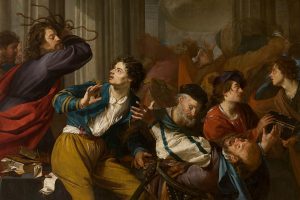Readings (Year A):
Isaiah 60:1 – 6
Psalms 72:1 – 2, 7 – 8, 10 – 11, 12 – 13
Ephesians 3:2 – 3a, 5 – 6
Matthew 2:1 – 12
Reflection: Protecting the vulnerable among us
It’s hard to miss the ominous tone of the last words of today’s gospel: “having been warned in a dream…they departed for their country by another way” (Matthew 2:12). That’s the first of two travel advisories, because in the very next verse, again by means of a dream, Joseph is told to flee with his family to Egypt. The magi were set in motion by hopeful promise, but the consequences of their quest come at a tremendous cost, a government sanctioned massacre of children.
Among the many artistic images of the magi, the one that captures best, for me, the tensions and risks at stake in the second chapter of Matthew’s gospel is a Covid-era wooden carving of los Tres Reyes Magos by the Puerto Rican artisan Héctor Orta. Mounted on horseback, with gifts in hand, the magi wear medical masks covering their noses and mouths.
With this simple detail, a sign of our times, the artist communicates a responsibility to protect the vulnerable, a vulnerability that is assumed in the Incarnation of the Word. Whether the magi were scholars, sovereigns, or interpreters of the heavens they address, through their gifts of gold, frankincense and myrrh, the fragility of human life with its economic insecurities and health challenges. The more exotic gifts, frankincense and myrrh, are valued to this day for their therapeutic properties.
We know next to nothing about the magi from the gospel, and much of what we pass on, including their names and number, comes from some early apocryphal texts, fanciful medieval legends, and cultural adaptations that have attempted to fill in the gaps across the centuries. The masks worn in the contemporary carving of Orta’s Tres Reyes are significant because they reflect, like many of the stories that arose across time, a profound commitment by the magi to care for and about the welfare of others—a commitment born of their encounter with the mystery of the divine in the incarnation.
Perhaps the gospel never commits to the number of magi because we are all invited to count ourselves among their company. The infancy narrative in the gospel of Matthew reminds us of the fragility of life encountered on the journey: the vulnerability of an infant and their post-partum mother; the vulnerability of refugees at the mercy of strangers; the vulnerability of children threatened by violence.
Orta’s masked magi remind us of our responsibility to protect each other on the journey, especially our most vulnerable. This obligation arises from the epiphany of the divine image in ourselves and through our encounters with the incarnate Word in each other.














Add comment